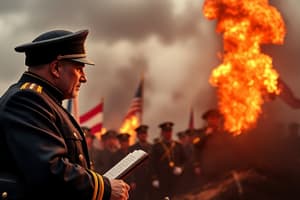Podcast
Questions and Answers
What event is often considered a major catalyst for the start of World War II?
What event is often considered a major catalyst for the start of World War II?
- Battle of Stalingrad
- Yalta Conference
- Invasion of Poland (correct)
- D-Day
Which country was NOT part of the Axis alliance during World War II?
Which country was NOT part of the Axis alliance during World War II?
- France (correct)
- Japan
- Italy
- Germany
Who was the leader of the Soviet Union during World War II?
Who was the leader of the Soviet Union during World War II?
- Benito Mussolini
- Emperor Hirohito
- Adolf Hitler
- Joseph Stalin (correct)
What was a key cause of World War II mentioned in the text?
What was a key cause of World War II mentioned in the text?
Which conference in 1945 played a crucial role in shaping the post-World War II world?
Which conference in 1945 played a crucial role in shaping the post-World War II world?
Which term describes the state-sponsored persecution and murder of millions of Jews and other minority groups during World War II?
Which term describes the state-sponsored persecution and murder of millions of Jews and other minority groups during World War II?
What was a major impact of World War II on cultural heritage according to the text?
What was a major impact of World War II on cultural heritage according to the text?
Which action by the Axis powers led to the deportation of millions of people to extermination camps and labor camps?
Which action by the Axis powers led to the deportation of millions of people to extermination camps and labor camps?
What aspect of World War II caused widespread destruction of cities and infrastructure particularly in Europe and Asia?
What aspect of World War II caused widespread destruction of cities and infrastructure particularly in Europe and Asia?
Which outcome of World War II created millions of displaced persons and war orphans?
Which outcome of World War II created millions of displaced persons and war orphans?
Flashcards are hidden until you start studying
Study Notes
World War II: A Global Conflict
World War II, a conflict spanning six years from 1939 to 1945, remains one of the most significant events in human history. Its causes, key events, and impact on civilians offer a complex and multifaceted narrative.
Causes
The origins of World War II are often traced back to the aftermath of World War I, with the Treaty of Versailles and other peace treaties leading to political and economic instability. Additionally, the rise of fascism, militarism, and nationalism in Germany, Italy, and Japan created a volatile environment. Key causes also included territorial ambitions, the desire for resources, and a pursuit of ideological superiority.
Key Players
The three main alliances—the Axis (Germany, Italy, and Japan), the Allies (United States, Great Britain, France, and later the Soviet Union), and neutral nations like Switzerland, Sweden, and Spain—shaped the conflict. The leaders who most significantly influenced World War II include:
- Adolf Hitler (Germany)
- Benito Mussolini (Italy)
- Emperor Hirohito (Japan)
- Winston Churchill (United Kingdom)
- Franklin D. Roosevelt (United States)
- Joseph Stalin (Soviet Union)
Key Events
Some of the most significant events of World War II include:
- Invasion of Poland (1939)
- Operation Barbarossa (1941)
- Attack on Pearl Harbor (1941)
- Battle of Stalingrad (1942–1943)
- D-Day (1944)
- Yalta and Potsdam conferences (1945)
- Atomic bombings of Hiroshima and Nagasaki (1945)
Impact on Civilians
World War II caused untold suffering for civilians through forced migration, starvation, and the targeting of civilian populations.
-
Deportations and forced labor: The Axis powers deported millions of people, including Jews, Slavs, and gypsies, to extermination camps, labor camps, and ghettos.
-
Genocide: The Holocaust, the systematic, state-sponsored persecution and murder of millions of Jews and other minority groups, was one of the most horrific acts of genocide in human history.
-
Collateral damage: The war caused widespread destruction of cities and infrastructure, particularly in Europe and Asia.
-
Refugees: World War II created millions of refugees, including displaced persons and war orphans.
-
Cultural losses: The war led to the destruction of cultural heritage, including the looting of art and cultural objects.
World War II left an indelible mark on history, shaping the political and global landscape that we live in today. Its consequences continue to be felt, and it stands as a powerful reminder of the dangers of unchecked militarism and the importance of peace and cooperation in resolving international conflicts.
Studying That Suits You
Use AI to generate personalized quizzes and flashcards to suit your learning preferences.




